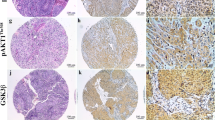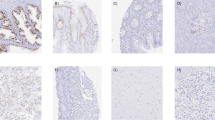Abstract
Prostasin is a glycosylphosphatidylinositol-anchored serine protease widely expressed in epithelial cells, with crucial epidermal barrier functions. Evidence has suggested prostasin may have served as a tumor suppressor in various cancers, but its role in oral squamous cell carcinoma (OSCC) remains unclear. Thus, herein, we conducted an immunohistochemical prostasin study in 119 resected OSCC cases. Prostasin expression was decreased in 63% (75/119) of cases. OSCC with decreased prostasin immunoreactivity (low prostasin cases) tended to show a higher histological grade (p = 0.0088) and a more infiltrative cancer cell morphology (p = 0.0024). We then explored the role of prostasin in the OSCC cell lines: SAS and HSC-4. SAS did not express detectable prostasin levels, whereas HSC-4 expressed low but distinct levels. Prostasin overexpression suppressed the proliferation and migration of both OSCC lines in vitro. Conversely, prostasin silencing significantly enhanced growth rates of HSC-4. Finally, we analyzed the impact of prostasin expression on the prognosis of patients with OSCC; decreased expression tended to correlate with shorter overall survival (p = 0.0291) after resection. This trend was supported by our analyses using a public database (Kaplan–Meier plotter) of head and neck squamous cell carcinomas. In conclusion, we showed decreased prostasin expression was associated with aggressive features and a poorer prognosis of OSCC.







Similar content being viewed by others
References
Yu JX, Chao L, Chao J. Prostasin is novel human serine protease from seminal fluid. Purification, tissue distribution, and localization in prostate gland. J Biol Chem. 1994;269:18843–8.
Tamir A, Gangadharan A, Balwani S, et al. The serine protease prostasin (PRSS8) is a potential biomarker for early detection of ovarian cancer. J Ovarian Res. 2016;31:9–20.
Vallet V, Chraibi A, Gaeggeler HP, Horisberger JD, Rossier BC. An epithelial serine protease activates the amiloride-sensitive sodium channel. Nature. 1997;389:607–10.
Bruns JB, Carattino MD, Sheng S, et al. Epithelial Na+ channels are fully activated by furin- and prostasin-dependent release of an inhibitory peptide from the gamma subunit. J Biol Chem. 2007;282:6153–60.
Leyvraz C, Charles RP, Rubera I, et al. The epidermal barrier function is dependent on the serine protease CAP1/Prss8. J Cell Biol. 2005;170:487–96.
Hummler E, Dousse A, Rieder A, et al. The channel-activating protease CAP1/PRSS8 is required for placental labyrinth maturation. PLoS ONE. 2013;8: e55796.
Chen LM, Chai KX. Prostasin serine protease inhibitors breast cancer invasiveness and is transcriptionally regulated by promoter DNA methylation. Int J Cancer. 2002;97:323–9.
Sakashita K, Mimori K, Tanaka F, et al. Clinical significance of low expression of prostasin mRNA in human gastric cancer. J Surg Oncol. 2008;98:559–64.
Bao Y, Li K, Guo Y, et al. Tumor suppressor PRSS8 targets Sphk1/S1P/Stat3/Akt signaling in colorectal cancer. Oncotarget. 2016;7:26780–92.
Ma C, Ma W, Zhou N, Chen N, An L, Zhang Y. Protease serine S1 family member 8 (PRSS8) inhibits tumor growth in vitro and in vivo in human non-small cell lung cancer. Oncol Res. 2017;25:781–7.
Bao Y, Wang Q, Guo Y, et al. PRSS8 methylation and its significance in esophageal squamous cell carcinoma. Oncotarget. 2016;7:28540–55.
Zhang L, Jia G, Shi B, Ge G, Duan H, Yang Y. PRSS8 is downregulated and suppresses tumour growth and metastases in hepatocellular carcinoma. Cell Physiol Biochem. 2016;40:757–69.
Yang HY, Fang DZ, Ding LS, Hui XB, Liu D. Overexpression of prostate serine 8 inhibits glioma cell proliferation, migration, and invasion via suppressing the Akt/mTOR signaling pathway. Oncol Res. 2017;25:923–30.
Yamamoto K, Kawaguchi M, Shimomura T, et al. Hepatocyte growth factor activator inhibitor type-2 (HAI-2)/SPINT2 contributes to invasive growth of oral squamous cell carcinoma cells. Oncotarget. 2018;9:11691–706.
Jou A, Hess J. Epidemiology and molecular biology of head and neck cancer. Oncol Res Treat. 2017;40:328–32.
Shield KD, Ferlay J, Jemal A. The global incidence of lip, oral cavity, and pharyngeal cancers by subsite in 2012. CA Cancer J Clin. 2017;67:51–64.
Chinn SB, Myers JN. Oral cavity carcinoma: current management, controversies, and future directions. Oral Oncol. 2015;33:3269–76.
Bryne M, Jenssen N, Boysen M. Histological grading in the deep invasive front of T1 and T2 glottic squamous cell carcinomas has high prognostic value. Virchows Arch. 1995;427:277–81.
Hou GX, Liu P, Yang J, Wen S. Mining expression and prognosis of topoisomerase isoforms in non-small-cell lung cancer by using Oncomine and Kaplan-Meier plotter. PLoS ONE. 2017;12: e0174515.
Nagy A, Munkacsy G, Gyorffy B. Pancancer survival analysis of cancer hallmark genes. Sci Rep. 2021;11:6047. https://doi.org/10.1038/s41598-021-84787-5.
Tamir A, Gangadharan A, Balwani S, et al. The serine protease prostasin (PRSS8) is a potential biomarker for early detection of ovarian cancer. J Ovarian Res. 2016;9:1–13.
Chen LM, Zhang X, Chai KX. Regulation of prostasin expression and function in the prostate. Prostate. 2004;59:1–12.
Chen LM, Verity NJ, Chai KX. Loss of prostasin (PRSS8) in human bladder transitional cell carcinoma cell lines is associated with epithelial-mesenchymal transition (EMT). BMC Cancer. 2009;9:377.
Bao Y, Guo Y, Yang Y, Wei X, et al. PRSS8 suppresses colorectal carcinogenesis and metastasis. Oncogene. 2019;38:497–517.
Acknowledgements
We thank Ms. J. Kurogi and A. Nishida for their skilled technical assistance. The authors also thank Enago (www.enago.jp) for English review.
Funding
This work was supported by Japan Society for the Promotion of Science KAKENHI 20K18483 (K.Y.) and 17K08764 (T.F.) and by a Grant for Clinical Research from Miyazaki University Hospital.
Author information
Authors and Affiliations
Contributions
KY and FY performed experiments, collected samples, performed analyses, and drafted the manuscript. MK, AI, and TK analyzed data and discussed experimental design and results. HK discussed experimental design. TK and YY collected samples and contributed to patient management. TF designed experiments, discussed experimental design and results, analyzed data, and contributed to the writing of the final manuscript.
Corresponding author
Ethics declarations
Conflict of interest
The authors declare no competing interests.
Ethical approval
The study protocol was performed in accordance with the revised Helsinki Declaration of 2008 and approved by the Institutional Review Board of the Faculty of Medicine, University of Miyazaki (ethics approval number: 2014-006).
Informed consent
Opt-out consent was applied during this study.
Additional information
Publisher's Note
Springer Nature remains neutral with regard to jurisdictional claims in published maps and institutional affiliations.
Supplementary Information
Below is the link to the electronic supplementary material.
Rights and permissions
About this article
Cite this article
Yamamoto, K., Yamashita, F., Kawaguchi, M. et al. Decreased prostasin expression is associated with aggressiveness of oral squamous cell carcinoma. Human Cell 34, 1434–1445 (2021). https://doi.org/10.1007/s13577-021-00575-3
Received:
Accepted:
Published:
Issue Date:
DOI: https://doi.org/10.1007/s13577-021-00575-3




